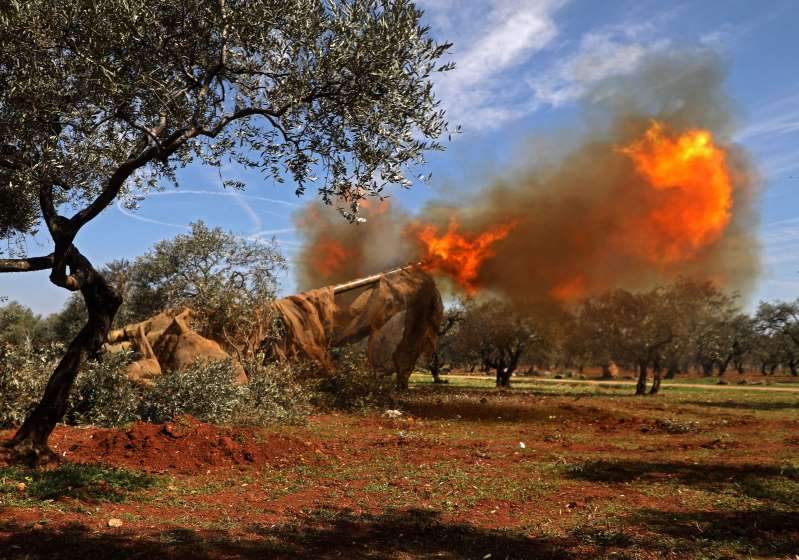Turkey Troops 'Merge with Terrorist Bases' in Syria, Russia Alleges

The Russian military is accusing its Turkish counterpart of embedding its armed forces among militant positions in an insurgent-held corner of Syria as violence escalates one day before a critical summit between Moscow and Ankara's heads of state. The two sides are also accusing enemy forces of plotting chemical attacks.
The Russian Defense Ministry alleged that "#Turkey has allowed its observations posts, established under 2018 #Sochi deal, to virtually merge with #terrorist bases in #Idlib," according to a tweet posted Wednesday by Moscow's embassy in Damascus. "In violation of international law it has deployed a strike force the size of a mechanized division there."
Russia and Turkey support opposite sides of Syria's nine-year civil war, with the former joining Iran in backing President Bashar al-Assad and the latter being the last major world power to support the insurgency fighting to oust him. Rebels and jihadis have faced successive defeats at government hands, leaving them only in control of parts of northwestern Idlib province, where an intense offensive has led to direct deadly conflict between the Syrian and Turkish militaries.
In an attempt to ease tensions and implement a previously-established ceasefire, Russian President Vladimir Putin and Turkish President Recep Tayyip Erdogan are set to meet Thursday in Moscow. In spite of these talks, tensions are rising and clashes continue on the ground.
Russia has accused Turkey of violating the 2018 ceasefire agreement by failing to disarm militant groups such as Hayat Tahrir al-Sham, the former Syrian branch of Al-Qaeda that dominates Idlib. The jihadi coalition is reportedly involved in fighting alongside Turkey-backed Syrian rebels against the government and its allies, which include Iran-supported militias like the Lebanese Hezbollah.
Ankara has defended its deployment of additional troops and military equipment to Idlib by arguing that the Syrian military has violated the ceasefire and killed Turkish troops in the process. Turkish Defense Minister Hulusi Akar has dismissed accusations that his forces had violated the Sochi agreement.
"We have fulfilled all our responsibilities arising from mutual agreements in Idlib as a guarantor country, and we continue to do so. The activities carried out in Idlib are done so in accordance with our rights and responsibilities as a guarantor to the Astana and Sochi agreements," Akar said in a statement published Wednesday by the Turkish Defense Ministry. "For this purpose, our efforts will continue in all areas."
"The most violent and unwavering response has been given to the attacks against our troops, our observation points and our positions within the scope of legitimate defense. Our target in the scope of legitimate defense is the regime soldiers and their elements that attack our troops," Akar added, calling on Russia, to fulfill its own commitments by exerting "its influence on the regime to stop its attacks and adhere to the boundaries of the Sochi agreement."
The Russian and Turkish militaries also accused their respective foes Wednesday of plotting chemical attacks.
The Russian Defense Ministry's Center for Reconciliation of the Opposing Sides claimed that "a group of up to 15 terrorists carried out an attempt to set off high-explosive ammunition with containers filled with toxic chemical substances" but a leak broke out and the would-be perpetrators "were severely poisoned by chemicals and failed to explode munitions and carry out their provocation," according to the state-run Tass Russian News Agency. Turkey's Operation Spring Shield separately alleged that "the soldiers of the Assad regime are preparing to use chemical weapons in Idlib," citing intelligence sources.
At least hundreds of thousands of civilians have fled the fighting that has ravaged Idlib, putting further pressure on Turkey, which already hosts more than 3.5 million Syrian refugees. Ankara has appealed for Western support and, receiving an unsatisfactory response, allowed crowds of refugees to freely travel to neighboring Greece, where they have been disallowed entry.
As the situation on the ground worsened, Erdogan has also sought greater military support from other members of the NATO Western military alliance, especially the United States. Washington initially joined Ankara in supporting the insurgency against Assad but later shifted its mission to defeating the Islamic State militant group (ISIS) by supporting the mostly Kurdish Syrian Democratic Forces, largely disavowed by Turkey as filled with outlawed separatists.
Still, the U.S. has remained deeply critical of the Syrian government and sent special representative James Jeffrey to Turkey on Tuesday to assure Erdogan that Washington would continue supporting its NATO ally. Jeffrey said the Pentagon would supply the Turkish armed forces, specifically mentioning "ammunition," but a State Department spokesperson later downplayed the comments as "nothing particularly new."
"He was talking in the context of what we are already doing," the spokesperson told Newsweek on Tuesday. "Turkey is a NATO Ally with a largely US equipped and supplied military. In his comments, he acknowledged that we are considering Turkish requests for assistance."
Though the White House is reportedly considering a Turkish request to send Patriot surface-to-air missile systems, President Donald Trump has indicated a willingness to scale down U.S. involvement in Syria's long-running war. With ISIS largely defeated and two U.S. partners, Turkey and Syrian Kurds clashing along the northern border, Trump in October again shifted the U.S. mission in Syria to maintaining control of oil fields in the country's east.
Photo: © AAREF WATAD/AFP/Getty Images Members of Syria's Turkey-backed insurgent National Liberation Front fire a 130 mm cannon during fighting with Syrian government forces on March 4 in Syria's northwestern Idlib province. A ceasefire brokered by Russia and Turkey in September 2018 has routinely broken down, with conflict substantially intensifying since last December.











